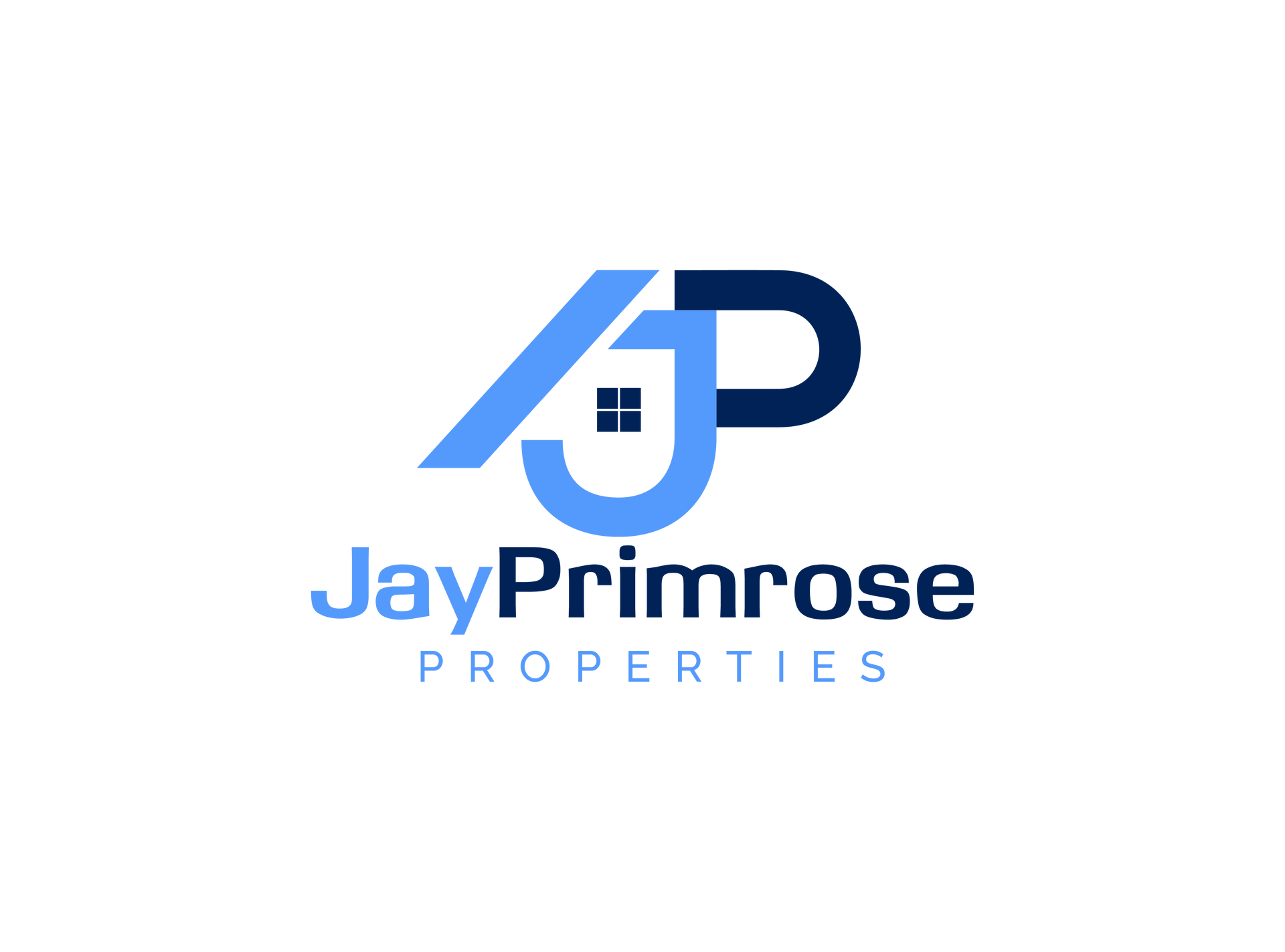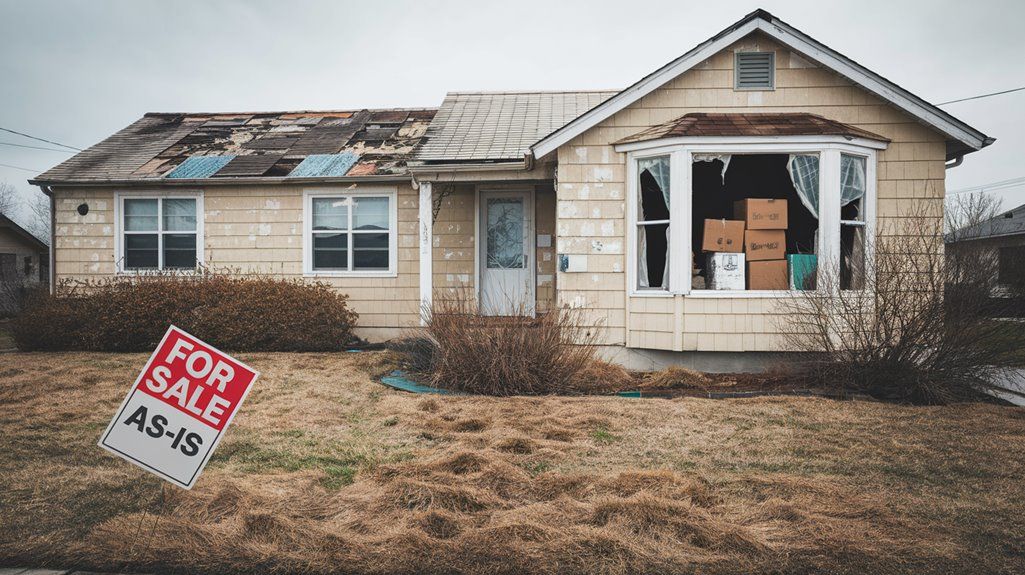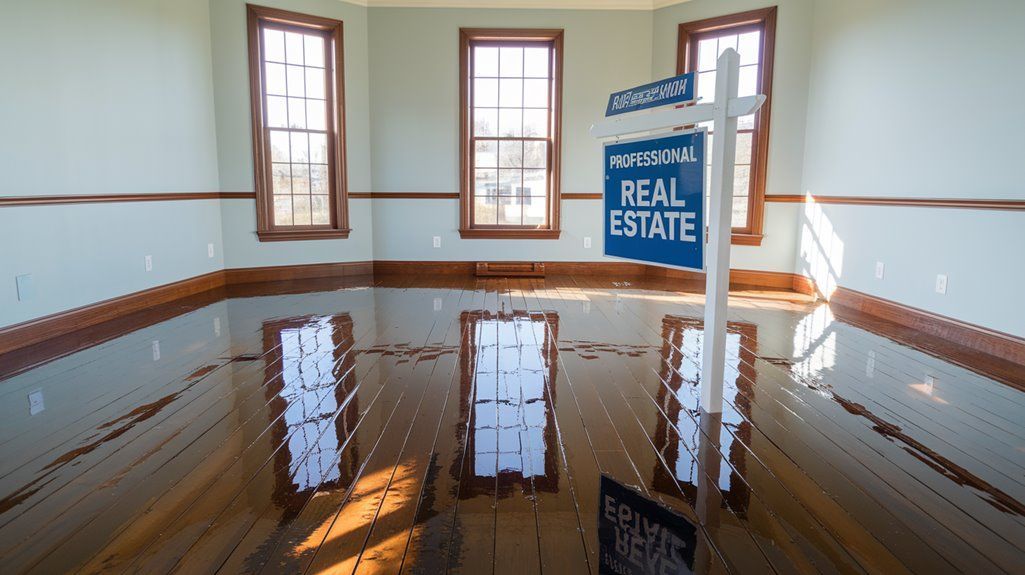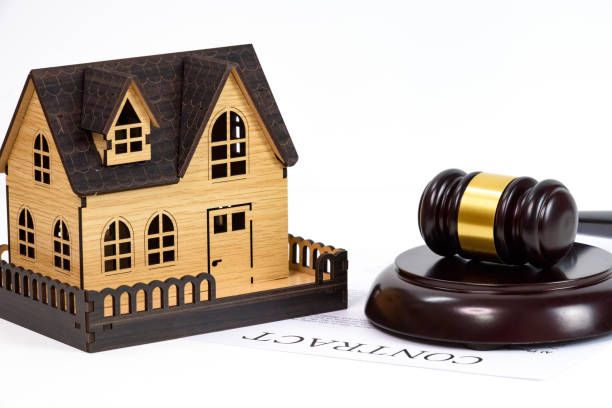Selling a House With Mold: Everything You Need to Know
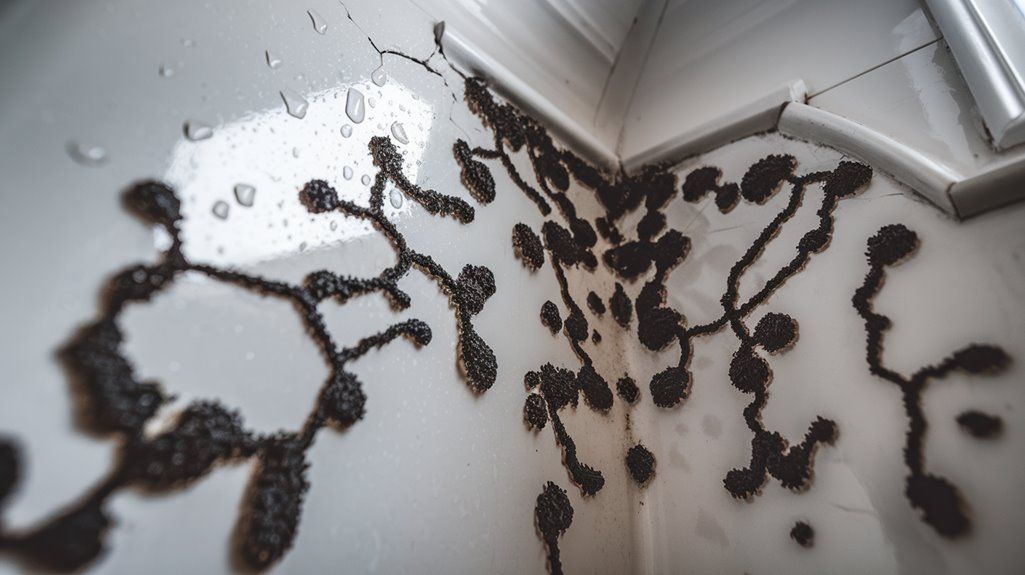
Discovering mold in your home when you’re planning to sell can be overwhelming. Most homeowners panic when they spot those dark patches on walls or detect musty odors.
You might worry about decreased property value, potential health risks, and the impact on your sale timeline. The presence of mold can scare away potential buyers and complicate the selling process.
If buyers discover mold during inspection, they might back out or demand significant price reductions. Even worse, you could face legal issues if you don’t disclose mold problems properly.
You can successfully sell a house with mold by either fixing the problem first or selling as-is to cash buyers. This guide will show you practical steps to navigate mold issues and complete your home sale effectively.
Key Takeaways
- Legal disclosure of mold issues is mandatory, and failure to inform buyers can result in severe legal consequences.
- Professional mold inspection and remediation protect property value and demonstrate commitment to addressing the problem properly.
- Document all mold-related repairs, treatments, and inspections to build buyer trust and comply with legal requirements.
- Adjust property price based on market value minus remediation costs, or consider selling to cash buyers as-is.
- Maintain transparent communication about mold history and share detailed records of all remediation efforts with potential buyers.
Can You Sell a House with Mold?
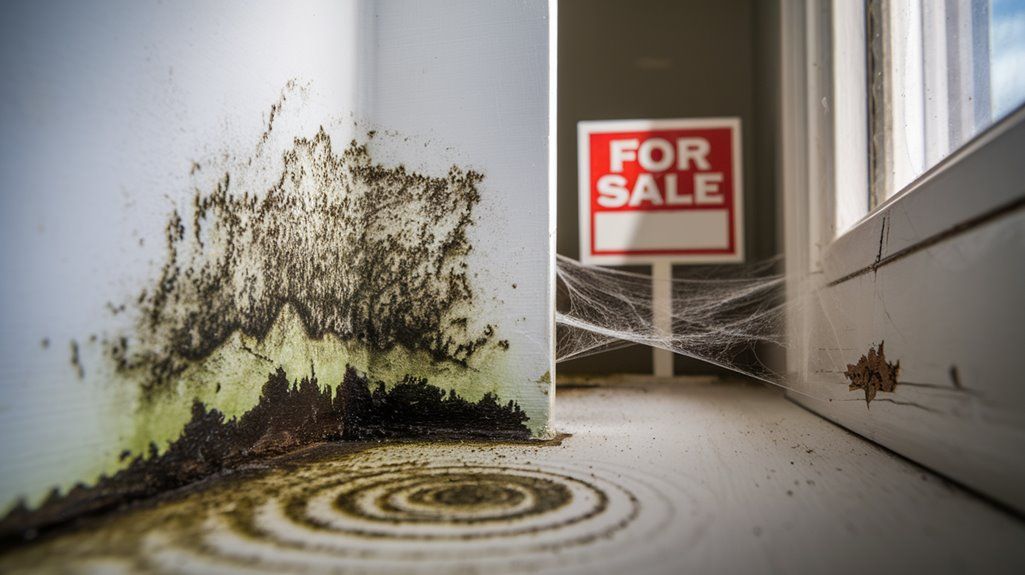
You can legally sell a house with mold, but you must follow specific steps. You need to inform potential buyers about any known mold problems in your home. If you hide this information, you could face serious legal issues later.
This situation requires a professional mold inspection before listing your property. A thorough inspection will reveal the full extent of mold damage.
If your house has extensive mold, professional remediation can boost its market value. Most buyers avoid homes with mold because it can trigger health problems.
So you have two clear options when selling a house with mold. You can fix the mold issue before selling the property. Or you can lower the price to cover future remediation costs.
When buyers know about mold problems upfront, they feel more confident about the purchase. Since mold issues affect property value, transparency helps build trust with potential buyers.
If you choose to sell without fixing the mold, your home’s price should reflect this condition. While some buyers might walk away, others will consider the reduced price attractive.
Is it legal to sell a house with mold?
You can legally sell a house with mold, but specific rules must be followed. If you plan to sell, transparency about mold problems will protect you from future legal issues.
The law requires sellers to inform buyers about existing mold conditions. You should create detailed records of any known mold problems in your home. This documentation will serve as proof of your honest disclosure to potential buyers.
When buyers know about mold issues, they can make informed decisions. It helps to provide them with past remediation reports and inspection findings. While mold might affect your property value, honest disclosure builds trust with potential buyers.
If you hide mold problems, you could face serious legal consequences later. The sale price should reflect your home’s current condition, including mold issues. So, working with experienced real estate agents can help set fair market prices.
The final selling price will depend on the mold’s extent and location. This means you might need to lower your asking price accordingly. You should consider getting professional mold assessment before listing your property.
How to Sell a House with Mold
When selling a house with mold, you’ll first need to determine the extent of the problem through a thorough inspection of visible growth and potential hidden areas.
You should weigh the costs and benefits of professional mold remediation, as addressing the issue upfront can make your home more marketable and possibly command a better price.
If you opt for remediation, you’ll want to document all inspection findings and treatment steps to demonstrate transparency and build trust with potential buyers.
Assess the Mold Problem
A mold assessment reveals the extent of contamination in your property before selling it. You need to check both visible and hidden mold growth throughout the house. If you spot any dark patches, it could indicate a serious mold problem.
This inspection should focus on specific warning signs:
- Dark patches or stains appear on walls and ceilings
- Musty smells linger in damp areas
- Water marks show up with peeling paint
We recommend hiring a certified mold inspector for thorough evaluation. A professional inspector will use special tools to find hidden mold problems.
If you see any concerning signs, you should act quickly to address them. While some mold issues may look minor, they can indicate deeper structural problems.
You will get detailed reports from professional inspectors about the mold situation. These reports help determine the best course of action for your property.
Since mold can spread quickly, early detection becomes crucial. When moisture problems exist, the risk of mold growth increases significantly.
Consider Mold Remediation
Professional mold remediation helps protect your property value and ensures safe living conditions. You need to hire certified mold experts for a complete inspection of your home. These professionals will create a detailed plan to remove all mold growth.
The team will use specialized equipment and methods to clean affected areas. If you address mold properly, your home will attract more potential buyers.
We recommend keeping all documents about the mold treatment process. This includes inspection reports, cleaning procedures, and final test results.
You should be open with buyers about past mold issues and solutions. When buyers know about resolved mold problems, they feel more confident.
If the mold damage is severe, you have two main options. You can fix the problem before listing your house. Or, you might offer buyers money to handle the remediation themselves.
Identify and Fix the Moisture Source
You must locate water problems before tackling any mold issues in your home for sale. If you ignore hidden moisture sources, mold will keep coming back.
This guide focuses on key areas to prevent mold growth:
- You should check all plumbing systems for possible leaks and damages.
- We recommend inspecting roofs and gutters for signs of water intrusion.
- You need to test basement walls and floors for moisture problems.
So, these steps will help you fix moisture issues:
- If you install dehumidifiers, they will control indoor humidity levels effectively.
- When ventilation systems work properly, they reduce excess moisture in bathrooms.
- This repair process must include fixing damaged seals around windows and doors.
- You should upgrade old ventilation systems in kitchens and bathrooms.
Buyers will feel confident about their purchase if all moisture problems are solved. Therefore, we suggest taking a thorough approach to moisture control. Your home sale will benefit from complete moisture remediation.
Contain and Remove Mold-Infested Materials
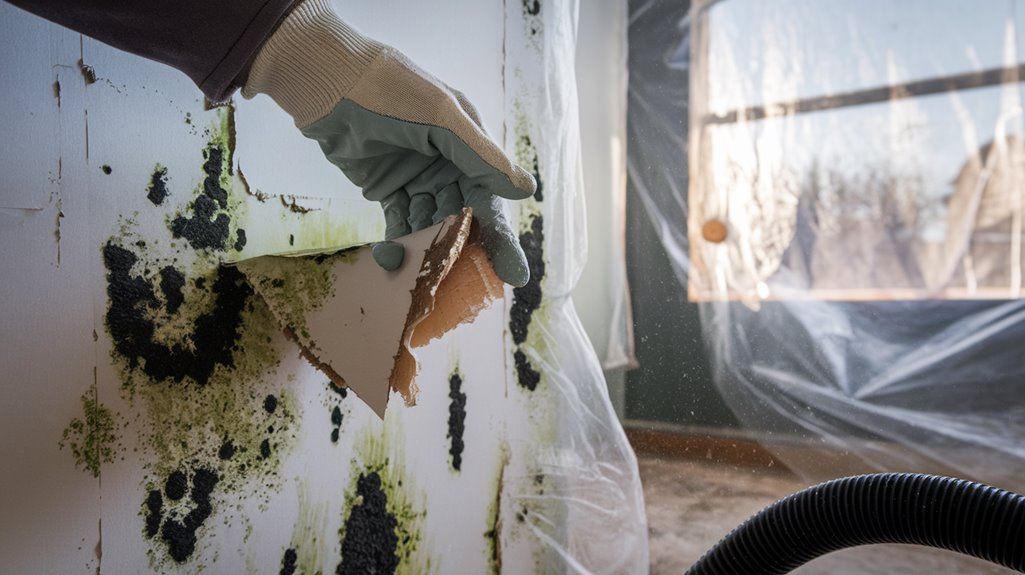
Proper containment and removal techniques prevent dangerous mold spores from spreading throughout your home.
You must use plastic sheeting and tape to isolate areas with visible mold growth. If the affected area exceeds 10 square feet, professional mold services should handle the cleanup.
We recommend wearing full protective equipment for smaller cleanup jobs. You should double-bag all contaminated materials in plastic before disposal.
This process requires careful removal of affected materials like drywall and carpeting. Since porous items absorb mold deeply, you cannot salvage severely infected materials.
While working, proper barriers must stay in place to block spore movement. So, take extra care when sealing off work areas with plastic sheeting. When cleanup is complete, you should disinfect the entire space thoroughly.
If you handle the removal incorrectly, mold can spread to other areas quickly. Hence, following safety protocols during containment and removal is essential. After addressing underlying moisture issues, thorough cleaning will prevent future growth.
Clean and Disinfect Affected Areas
You must clean and disinfect mold-affected surfaces to prevent health risks and future growth. This process needs special products and proper methods for safe mold removal.
If you want effective results, you should follow these important steps:
- You must select EPA-approved cleaners made for mold removal.
- We recommend using HEPA vacuums to clean affected areas safely.
- You should apply strong disinfectants to kill mold spores.
When dealing with small areas, you can handle the cleanup yourself. However, if the affected area is large, you should hire a professional.
This cleanup process requires proper safety gear and careful attention to detail. You must wear gloves, goggles, and masks while cleaning mold-affected surfaces.
If the mold returns after cleaning, you should check for ongoing moisture problems. Since mold thrives in damp conditions, you must fix water issues first.
We suggest testing the area after cleaning to ensure complete mold removal. So, this final step helps confirm the effectiveness of your cleaning efforts.
Dry, Restore, and Prevent Future Growth
After completing thorough mold remediation, you’ll need to ensure the affected areas remain completely dry and restored to prevent future growth before listing your home.
You can price your property competitively and list it once you’ve documented all remediation efforts, or alternatively, consider selling to cash buyers if you prefer to skip extensive repairs.
Your choice between full remediation versus selling as-is will impact your negotiating position and final closing price, so evaluate your options based on your timeline and financial goals.
Price the House Competitively
You need to set a fair price when selling a home with previous mold issues. This approach requires careful consideration of market value and necessary price adjustments.
We recommend starting with the current market value of similar properties in your area. You should then subtract the total cost of professional mold remediation work. This calculation helps buyers understand your transparent pricing strategy.
It is essential to document all mold treatment and repairs thoroughly. If you have made recent improvements, they can help offset concerns about past problems.
You will find success by researching similar properties that had mold issues in your area. This information provides a realistic baseline for your pricing strategy.
When you price the house below market value, it attracts more potential buyers. So, you can avoid multiple price reductions that might raise red flags.
If buyers see your honest approach to pricing, they will feel more confident about making offers. This strategy leads to smoother negotiations and faster sales.
We suggest working with a real estate agent who has experience in similar situations. Your agent can help determine the most competitive price point for your property.
List Your House
You must take specific actions before selling a house with previous mold problems. We recommend documenting each step of your mold treatment with clear photos and reports.
This proof shows buyers that you handled the problem correctly. You should keep all receipts from professional mold removal services.
Good ventilation will prevent new mold growth in your home.
If you install dehumidifiers, they will help maintain proper moisture levels. When water leaks occur, fix them immediately to stop future mold issues.
A skilled real estate agent can guide you through selling a home with mold history. They will explain local disclosure laws about previous mold problems. If complete mold removal isn’t possible, you might consider an as-is sale.
You should create a detailed record of your mold-related repairs and improvements. Your documentation will show buyers that you took the problem seriously.
When buyers see your thorough approach, they will feel more confident about the purchase. If you maintain proper moisture control, your home will stay mold-free for future owners.
Negotiate and Close the Sale
Successful home sales require clear communication about previous mold problems. You must keep records of all mold treatments and moisture control measures.
If buyers request information, you should provide complete documentation about past remediation work. We recommend sharing detailed reports from qualified mold inspectors and remediation specialists.
The key documents for negotiations include:
- Professional mold assessment reports
- Cost records from remediation work
- Test results showing current moisture levels
- Home inspection certificates
You can turn past mold issues into positive selling points. This approach shows your commitment to property maintenance and problem-solving. Your honesty will help build trust with potential buyers.
When buyers know about completed repairs, they feel more confident about the purchase. Transparency leads to faster negotiations and smoother closings. The documentation proves that you have addressed all moisture concerns properly.
If you maintain open communication, buyers will appreciate your professional approach. So keep detailed records and share them during the sales process.
Skip Remediation? Sell As-Is to Cash Home Buyers
Selling a house with mold to cash buyers offers a quick alternative to remediation. You can skip the time-consuming repair process and traditional financing hurdles. These investors will purchase properties despite existing mold problems.
While the offers may be lower than market value, you will save on repair costs. Cash buyers understand the challenges of mold-affected properties and provide straightforward solutions. If you need to move quickly, this option could be your best choice.
Since transparency remains a legal requirement, you must disclose all mold issues. The cash buyers will still make offers regardless of the mold situation.
When you contact multiple cash buyers, you can compare different offers. So you will have a better chance of securing the most favorable deal.
If your property needs extensive mold repairs, cash buyers might be particularly appealing. You won’t have to worry about lengthy remediation processes or buyer financing issues. This approach works well for sellers who lack funds for professional mold treatment.
Benefits of Selling a House with Mold As-Is
You can reduce stress and save money by selling your mold-affected house as-is. This approach means you’ll sell the property in its current condition without repairs.
The key advantages include:
- You will save substantial money since mold remediation often costs thousands of dollars.
- Cash buyers prefer as-is properties and can close deals quickly.
- This method eliminates the need for contractor coordination or repair delays.
If you choose to sell as-is, investors will become your primary target market. These buyers have experience with mold issues and understand property rehabilitation. Since they specialize in distressed properties, you can expect faster closing times.
While some sellers worry about legal issues, proper disclosure protects your interests. You must inform potential buyers about existing mold problems. This transparency helps prevent future disputes or legal complications.
Legal obligations when selling a house with mold?
You must disclose any known mold issues to potential buyers, as failing to do so could result in serious legal consequences and significant lawsuits after the sale.
Your state and local regulations will dictate specific disclosure requirements, including what information you’re legally obligated to share about current or past mold problems.
Working with a knowledgeable real estate agent can help ensure you meet all legal obligations while properly documenting your mold disclosures through the appropriate forms and paperwork.
Disclosure Requirements
You must inform buyers about any mold issues before selling your home. The law requires sellers to be open about current and past mold problems. If you hide these facts, buyers can take legal action after the sale.
When selling your home, take these steps:
- You should fill out your state’s mold disclosure forms accurately.
- We recommend keeping all records of mold inspections and fixes.
- You need to report any water issues that could cause mold.
This honest approach helps protect both buyers and sellers. If you share all mold-related facts, the sale process becomes easier. Buyers will trust you more when you show them inspection reports.
Since transparency matters, include details about past mold treatments. So, if your home had previous mold problems, tell buyers about the solutions. While some sellers worry about scaring buyers, hiding facts leads to bigger problems.
The sale will go smoothly if you maintain clear records. This includes proof of professional cleaning and repairs.
State and Local Regulations
State regulations control how homeowners must handle mold issues during property sales. You must check your local laws about mold disclosure before selling your house.
While some states need written proof of mold problems, others require professional cleaning first.
If you fail to report mold issues, you could face legal problems and lower property values. Your local laws might ask for detailed records of past mold problems and fixes. This information helps buyers make informed decisions about their purchase.
You should talk to a real estate lawyer about the rules in your area. When you share more than the required information, it builds trust with buyers. So, being open about mold issues can protect you from future legal troubles.
Ready to sell your house quickly? Contact Jay Primrose Properties today
Selling a house with mold requires careful planning and proper understanding of legal requirements. You must focus on honest disclosure and work with qualified professionals for accurate assessment. If the mold issue seems overwhelming, several options remain available to homeowners.
We help homeowners sell their mold-affected properties fast and hassle-free:
- We buy houses in Puyallup
- We buy houses in Spanaway
- We buy houses in Lakewood
- We buy houses in Auburn
- We buy houses in Orting
We at Jay Primrose Properties are professional cash home buyers who purchase properties in any condition. This means you can skip expensive mold remediation and lengthy repair processes. You will receive a fair cash offer within 24 hours after our inspection. So, if you want to sell your mold-affected house quickly, call us at Jay Primrose Properties today.
Give us a call anytime at 253-697-0007 or fill out this quick form to get started today!
Get A Fair Cash Offer On Your House
We will get back to you as soon as possible.
Please try again later.

About the author
Justin Baker
Justin Baker is the founder of Jay Primrose Properties, a leading cash home buying company based in Tacoma, WA. With a passion for real estate investing, Justin has helped numerous homeowners in the Pacific Northwest region sell their homes quickly and hassle-free. Justin believes that buying and selling real estate should be a seamless process and works tirelessly to ensure that his clients have a stress-free experience. With a deep understanding of the local real estate market and a commitment to exceptional customer service, Justin has established himself as a trusted and reliable cash home buyer in Tacoma and the surrounding areas.
Jay Primrose Properties
stands on trust, honesty, and on mutual respect that we share with our clients. We don’t want you to be left in a situation of regret and loss; don't be the victim of a slow market, let us
buy your house and give yourself peace of mind.
